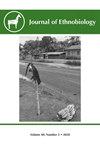Cotton Monocultures and Reorganizing Socioecological Life in Telangana, India
IF 1.3
3区 社会学
Q1 ANTHROPOLOGY
引用次数: 0
Abstract
Five hundred years of desire for cotton has reshaped landscapes, built global economic commodity chains, and devalued human life in the name of producing cheap clothing. Since 2001, cotton monocultures in South India have also reorganized genetic codes, continuing centuries of work to maintain the socioecological possibility of extractive agricultural production. This paper combines ethnographic and ethnobiological research in Telangana, India, to center cotton's role in organizing socioecological life for an agrarian world including farmers, farmworkers, plants, soils, buyers, weeds, and animals. Mutually exclusive systems of genetically modified Bt and organic cotton production offer a range of possible organizations of labor, aspiration, reciprocity, and labor. While historically situated in plantation inequalities, cotton production can also make unexpected room for socioecological relationships outside extractive monoculture.印度特兰甘纳邦的棉花单一种植与社会生态生活重组
五百年来,人们对棉花的渴求重塑了地貌,建立了全球经济商品链,并以生产廉价服装的名义贬低了人类生命的价值。自 2001 年以来,南印度的棉花单一种植也重组了遗传密码,延续了数百年来维持采掘型农业生产的社会生态可能性的工作。本文结合在印度特兰甘纳邦进行的人种学和人种生物学研究,集中探讨棉花在组织农业世界(包括农民、农场工人、植物、土壤、买家、杂草和动物)的社会生态生活中所扮演的角色。转基因 Bt 棉花和有机棉花生产的相互排斥系统提供了一系列可能的劳动组织、愿望、互惠和劳动。虽然棉花生产在历史上处于种植园的不平等地位,但它也能在单一采掘业之外为社会生态关系提供意想不到的空间。
本文章由计算机程序翻译,如有差异,请以英文原文为准。
求助全文
约1分钟内获得全文
求助全文
来源期刊

Journal of Ethnobiology
Social Sciences-Anthropology
CiteScore
4.80
自引率
3.40%
发文量
21
审稿时长
>12 weeks
期刊介绍:
JoE’s readership is as wide and diverse as ethnobiology itself, with readers spanning from both the natural and social sciences. Not surprisingly, a glance at the papers published in the Journal reveals the depth and breadth of topics, extending from studies in archaeology and the origins of agriculture, to folk classification systems, to food composition, plants, birds, mammals, fungi and everything in between.
Research areas published in JoE include but are not limited to neo- and paleo-ethnobiology, zooarchaeology, ethnobotany, ethnozoology, ethnopharmacology, ethnoecology, linguistic ethnobiology, human paleoecology, and many other related fields of study within anthropology and biology, such as taxonomy, conservation biology, ethnography, political ecology, and cognitive and cultural anthropology.
JoE does not limit itself to a single perspective, approach or discipline, but seeks to represent the full spectrum and wide diversity of the field of ethnobiology, including cognitive, symbolic, linguistic, ecological, and economic aspects of human interactions with our living world. Articles that significantly advance ethnobiological theory and/or methodology are particularly welcome, as well as studies bridging across disciplines and knowledge systems. JoE does not publish uncontextualized data such as species lists; appropriate submissions must elaborate on the ethnobiological context of findings.
 求助内容:
求助内容: 应助结果提醒方式:
应助结果提醒方式:


